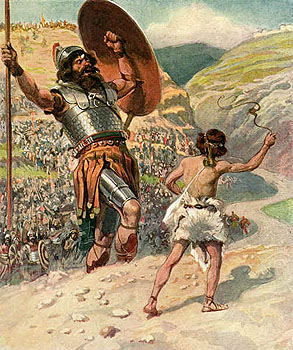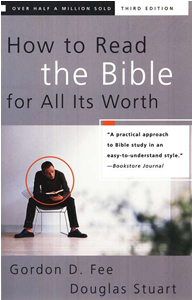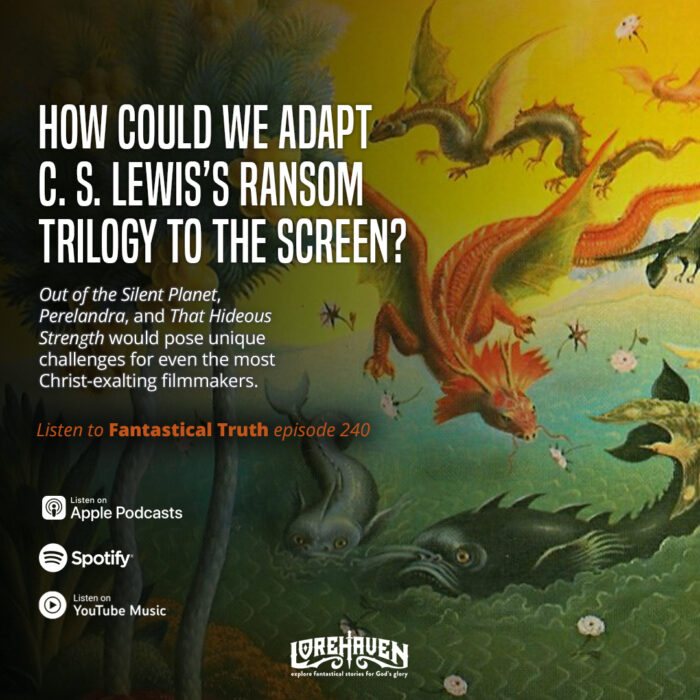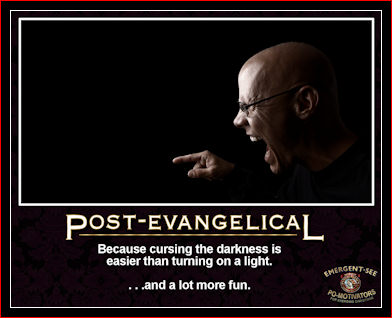Artist ‘priests,’ God-centered Definitions and More
You know those infamous “clip shows” television sitcoms sometimes have, perhaps at the end of a season when the financial and ideas budgets are both running low? This will not be like that. Rather I present here a roundup of various blog clips plus commentary for your snacking and discussion enjoyment, as the newly regenerated Speculative Faith enters its second year.
Avoiding the ‘priesthood of artists’
Musician Derek Webb professes Christianity and more-“loving” beliefs, but both of those seem missing in a recent interview, in which he implies that those who disagree with his approach:
- are not loving, caring Christians concerned about their world;
- are hopelessly stuck in Christian-subculture ghettos;
- may not be as enlightened as the kinder, gentler, more-tolerant-than-those-other-bad-Christians-so-you’ll-all-like-us-now,-yes? strain of faith that Webb professes.
Moreover, Webb’s words remind me of the trap that any Christian, regardless of denomination or political preferences, can fall into: striving to Fix The Church’s/The World’s Problems more than Proclaim God’s Gospel and His Glories. This also involves considering one’s self part of an elitist priesthood of artists who can just, you know, think more and see things others cannot:
Part of the luxury of being an artist is that you not only can but kind of have a responsibility to think long and hard about things on behalf of those who might listen to your music. You can give them a jumping off point for subject matter that might be too tangled for most people in the busyness of their daily lives.
But musicians, novelists and any other artists, beware: we should not place ourselves above God’s gift of pastors, teachers and believers in local churches that emphasize the Gospel and secondly its fruits in our lives, while we also fellowship even with those who don’t “get” or enjoy our creative products or supposedly superior ideas. Otherwise, just as they might miss things we show in our artsy gifts, we might miss something others show in their Biblical teaching gifts.
P.S.: While I was writing this Wednesday, Frank Turk at Pyromaniacs was posting a firm yet gracious open letter to Webb, which also addresses potential artist arrogance, and other notes.
More on greater, God-centered stories
Last week’s column may have left some wondering: how do we define “God-centered” stories versus stories that are merely “God-including”? I suggested that mainly entails recognizing that in the real-life story of our world, we must recognize that it’s we who fit into God’s agenda, not vice-versa. But that brings up a few questions:
- What about stories in which God or Christ is not a “character”? Must we always include Him directly to keep them God-centered?
- Would it be inferior, then, to have a Christ-character-including story in which the Christ-figure barely appears? Must we spend most of the story following Him around or else risk making things too man-centered?
The best way of addressing this may be pointing to the “true myths” of Scripture itself. How should they be read? — especially when, sometimes, God does seem to manifest to help His people fulfill their Destinies, or He is hiding in the background.

Some great thoughts come from author/pastor Tim Keller, whom Novel Journey writer Noël De Vries quoted last week. I found the source of that quote and now offer more from Keller’s original column. His emphasis is for preaching pastors, but his thoughts of how to tell true-life accounts from Scripture have nearly equal applications for other Christian storytellers:
For example, look at the story of David and Goliath. What is the meaning of that narrative for us? Without reference to Christ, the story may be (usually is!) preached as: “The bigger they come, the harder they’ll fall, if you just go into your battles with faith in the Lord. You may not be real big and powerful in yourself, but with God on your side, you can overcome giants.” But as soon as we ask: “how is David foreshadowing the work of his greater Son”? We begin to see the same features of the story in a different light. The story is telling us that the Israelites can not go up against Goliath. They can’t do it. They need a substitute. When David goes in on their behalf, he is not a full-grown man, but a vulnerable and weak figure, a mere boy. He goes virtually as a sacrificial lamb. But God uses his apparent weakness as the means to destroy the giant, and David becomes Israel’s champion-redeemer, so that his victory will be imputed to them. They get all the fruit of having fought the battle themselves.
This is a fundamentally different meaning than the one that arises from the non-Christocentric reading. There is, in the end, only two ways to read the Bible: is it basically about me or basically about Jesus? In other words, is it basically about what I must do, or basically about what he has done? If I read David and Goliath as basically giving me an example, then the story is really about me. I must summons up the faith and courage to fight the giants in my life. But if I read David and Goliath as basically showing me salvation through Jesus, then the story is really about him. Until I see that Jesus fought the real giants (sin, law, death) for me, I will never have the courage to be able to fight ordinary giants in life (suffering, disappointment, failure, criticism, hardship). For example how can I ever fight the “giant” of failure, unless I have a deep security that God will not abandon me? If I see David as my example, the story will never help me fight the failure/giant. But if I see David/Jesus as my substitute, whose victory is imputed to me, then I can stand before the failure/giant.
With that in mind: when you read Lord of the Rings, even without a direct Christ-figure a la Aslan, which elements stand out? Frodo’s bravery, Gondor’s majesty or Middle-earth’s beauty (themselves not sinful!) or the grander sweep of the epic that includes all these elements, yet points to Someone greater and more transcendent? Does Scripture affect us in similar ways — pointing to what God has done, over and above (though not ignoring) what His people will do in response? Do the other stories we enjoy, or read, have similar echoes of His greatest story?
On flawed characters in fiction
Last week Kaci Hill linked to the column about God-centered stories, and in reply Amy J. Rose Davis offered:
I find it interesting that Christians are very willing to talk about how Peter, Abram, Moses, Saul, David, Samson, et al were sinners and very messy heroes, but suggest that we shouldn’t have similar characters in our Christian fiction.
One reason for this disparity: many Christians are stuck in the rut of feeling they must have good-clean-relatively-flawless humans to Emulate. While admitting the Biblical heroes are not perfect, they may nevertheless fail to draw the conclusion and make the connection: we don’t need to be those heroes’ public relations and clean up their images, and the reason God chose those people despite their wretchedness was to glorify Himself even more to His people!
So when we strive to make Christian stories more Christ-centered, that sets us free to tell great stories while using flawed characters — like God does with us. Their failings not only reflect our own, or give them empathetic appeal, but point to Jesus as the only flawless and glorious One.
Loving greater stories for God’s sake
How do we avoid thinking too highly of ourselves as artists, seeking more God-centered stories, while keeping humans’ flaws in perspective? A possible twofold solution exists, and the first part is desiring to hunger for God-centeredness in all areas, while rejecting man-centered notions.
Amy Timco’s Dec. 16 comment summarized a Christian writer’s unique motive for seeking this:
I need to stop writing, stop trying to inject more artificial majesty and power into my character, and examine my personal theology. We can only create what we know, and if the Christ-figure in my novel is pathetic, my conception of Christ is pathetic. There’s no way around it. And the only way to fix it is to fix my theology. Everything flows from that.
For weeks I’ve also meant to credit and thank Becky Miller for her further thoughts on glorifying Christ as more than a “sidekick” in stories, instead making them increase our love for Him:
[S]tories that “till the soil” can be powerfully Christian. Such stories create the longing for the wholeness Christ gives, or for the acceptance His sacrifice made possible, or for the purpose His relationship frees us to achieve. I believe stories can show sacrificial love that is extraordinary and that will create a thirst for sacrificial love. I believe stories can show forgiveness that is pure and unmerited and it will create a thirst for similar mercy.
The second part of the solution: feeding that desire for Christ-centeredness, to know Him as He has revealed Himself, in ways that align as closely as possible with His Word.
Yet as the new year begins, it shouldn’t be too cliché to ask: is my desire growing? If not, what might I do to work out the salvation Christ has given me (Philippians 2: 12-13) and feed my hunger for His greatness, not just in the stories I enjoy or try to create, but in all that I do?
First: The Bible, of course. This year begins my wife’s and my attempt to read more of it, not just during occasional studies but with the whole read-the-Bible-in-one-year plan.
 As previously discussed, however, there can be wrong ways to read the Bible, and the read-it-to-find-mere-moral-lessons method is very infectious. That’s why reading nonfiction books that point to Scripture can also be helpful, whether they are topical works about specific doctrine or books that clarify how God (and human authors) intended Scripture’s books to be read, mindful of context and original readers (How to Read the Bible for All Its Worth is a great introduction).
As previously discussed, however, there can be wrong ways to read the Bible, and the read-it-to-find-mere-moral-lessons method is very infectious. That’s why reading nonfiction books that point to Scripture can also be helpful, whether they are topical works about specific doctrine or books that clarify how God (and human authors) intended Scripture’s books to be read, mindful of context and original readers (How to Read the Bible for All Its Worth is a great introduction).
Not only will reading and rightly applying Scripture help us focus better on Christ, it will subtly change the emphasis of our stories — those we enjoy and those we may write — toward Him. We won’t need to run around and artificial inject more Jesus parts; those will embed naturally.
And as Marc Schooley reminded us, imagine all the new ideas for fiction we find in nonfiction?
There are billions of characters to be written around Christian doctrines and they apply so vividly and directly to us…because they derive from the truths of Christianity. If the truths of Christianity are true, and they are, what study could bring you closer to a character’s heart than Christian doctrine? What conflict, emotional involvement, or driving need could be closer to the human condition, and thus a reader’s heart, not too mention her own and most intimate thoughts and experiences?
[…] By basing fiction upon deep doctrine—pick any one you want—the symbolism of any story will force its way into the text. You can’t even prevent it from doing so actually.
Viva la resolution
Oh yes. That was a long one. Congratulations for making it to the end. And now that you are here, I wonder anew: what projects do you have coming in the new year? Resolutions™? Books to read? Books to write? Books that aren’t actually books yet, until God blesses you with a publisher? Do share. Also know that all of us thank you so much for reading and contributing to Speculative Faith 2.0. And be sure to thank even more the master Author for this new year.











































Great post, and thanks for quoting me. 🙂 I haven’t been to your blog before the post that Kaci shared, but I will return… You are a thoughtful writer, and I’m intrigued by many of the things you’ve shared. The artist as priest idea is really interesting. I hadn’t thought about it before. I’m going to ruminate on that one for a while…
One thing I think about books that are more ambiguous about the Christian side of things, especially with regard to fantasy: Sometimes being less blatant with the truth will lure readers of non-religious persuasion who would never pick up a “Christian” book. And I think we don’t always have to share the Gospel itself to promote a truthful worldview. I have a lot of pagan, atheist, and agnostic friends who would not read something I had written if it had Christianity plastered all over the label, but even Jesus spoke in parables.
Great blog.
Amy
[…] This post was mentioned on Twitter by Megan. Megan said: RT @AmyJRoseDavis: Your Mileage May Vary, from @zoewinters: http://bit.ly/gE6VeR Great post to close out 2010. […]
Yes, artists and other intellectuals can be prickly and egotistical. Part of this could stem from the evangelical insistence on boiling the complex down to the sound bite, and throwing the more intransigent parts of Scripture into the same warehouse for inconvenient powers as the Ark of the Covenant at the end of “Raiders of the Lost Ark.” I applaud those ministers who embrace the complex and difficult in their teaching, and I believe that their response to the divine call deserves the highest respect. For those ministers who have turned their career into a tax-deductible form of sales and marketing, though, they are wasting the time of the attentive and misleading the pliable, who will not find any solace from their inch-deep theology when true crisis appears, and who will be too distracted by the bells and whistles each Sunday to bother the Enemy all that much during the week.
(Issues a low whistle …) Amen times ten, sir. And I do regret that some artists feel they must be the “priests” in place of not only the equal “priesthood” of all believers, but the great High Priest (reference: Hebrews) whom some professing pastors simply don’t preach about, favoring sales, marketing and moralism as you said. … Yet of course, other artists intentionally want a priestly role over and above God’s revelation, ignoring His appointment of more-direct pastors and teachers to expound on His Word.
whispers He was my English teacher. One of them. 0=)
Thanks, Stephen. I appreciate your faithful stand for the truth. May God multiply your ministry.
@Mr. Burnett,
I’ve been giving your column and answer some more thought. In what instances do you see the artist attempting to usurp the pastor’s role?
And now that I’ve managed to make an overall-gentle landing after being in orbit during most of the holidays, I can offer a response — and also to your other thoughts elsewhere:
I think it is, yet without confusing the means for the end. We’ve all heard of active professing Christians, on the “right” (who fight against, say, moral compromise, lack of discernment and needless pragmatism in churches) and on the “left” (who decry the way many churches have acted legalistically and unlovingly to, say, homosexuals, the homeless or the poor in general). Yet either side can lapse in “ministry myopia,” as if there is only one set of problems to fight against, and forget what and Who we’re fighting for — the Savior Who, despite His challenging words, also promised “rest.”
Often in my discussions with cultural “fundamentalists” (I mean not lovers of real Biblical truth, but those who confuse particular traditions with truth) and “emergent”-style Christians alike, I like to ask a question like this: what happens if, in all your zeal to Fight the Good Fight and that’s it, you end up in Heaven and there’s nothing to fight? No poor people to feed, no heresy to condemn, nothing that makes you feel or act like a Warrior as an end to itself. All you’d have left to do is worship Christ in other ways, be it music or work, exploration, subcreation, learning and more. In such a place, when all vestiges of self-as-“savior” are gone and there is only one Savior of us all, are you sure you would not be bored?
So the motivation for criticism of the church, Christ’s beloved Bride, matters: it’s to edify her, yes, even as an “institution,” and not simply to criticize all of her various ills for criticism’s sake. We exhort, discern and seek to improve for God’s sake, whether that includes how we do our Art or how we teach truth and theology.
I’ve gotten a bit nervous about Francis Chan in recent months (mostly because of his seeming overemphasis on wild-‘n-crazy Christianity as if that’s a higher spiritual plane than “regular” day-to-day, plodding Christianity). But in his book Crazy Love he rightly said this:
I’m also among the many Christians who want to love the Church, the Bride for whom Christ died (Ephesians 5), and want to see her more closely follow the pattern of Kingdom and Church growth (facilitated through local churches) prescribed in the Bible. Yet that can too easily overlap with, or become, criticism for its own sake, and an attitude of anti-everything-that’s-gone-on-before — the same kind of attitude C.S. Lewis termed “chronological snobbery.”
In recent weeks I’ve come to see that some of this is sourced by a very simplistic view of Jesus’ mission on earth. He criticized religious institutions of his day, goes this notion, so we should too. But this ignores the fact that Jesus didn’t fault the Pharisees merely for being “religious” or because they had “institutions,” but because they ignored God’s real Word in favor of their own traditions and rejected God’s actual Word because of their pride (Mark 7), and missed the whole point of the Law in the first place, which was to reveal people’s inability and point us to Christ (John 5).
Any kind of view that makes Jesus into a 24/7 promoter of merely “everything you thought you knew is wrong” not only flattens His nature and His main mission — to die for the sins of His people — but exalts Self As Savior, rather than Himself as Savior.
Webb’s interview, linked above, seems to be the most recent. I recognize that not everything can be said in an interview, and any interviewer might edit other good things that were said. But his “priesthood of artists” view seems to supersede any Biblical understanding of the equal “priesthood” of all believers (though with different gifts and roles), under the final High Priest (Christ Himself — cf. 1 Peter 2, the book of Hebrews).
Webb would likely decry the traditional views of some spiritual caste system, as if the pastors/priests/clergy/”second blessing” Christians/whatever are on one level, and the “laypersons” or less-spiritual Christians are on another. Without dismissing the Biblical role of overseers and elders (1 Timothy 3), that is an un-Biblical and hurtful notion.
But isn’t Webb simply setting himself up, even if by accident, as some kind of just-slightly-higher-“priest” because he’s an Artist? It is not just him who has a “responsibility to think long and hard about things” and “give [people] a jumping off point for subject matter that might be too tangled for most people in the busyness of their daily lives.” This smacks of a kind of spiritual-elitism, in the guise of humility.
If Webb is serious about wanting to point people to “tangled” and tricky truths, he’d best do it in the context of what the Bible does say: all believers are “priests” under Christ as the ultimate High Priest, with different roles and spiritual gifts, and that includes church overseers and pastors who are especially charged to teach the Word. No such charge is given in Scripture to some “priesthood of artists.”
I don’t mean to say Artists — including writers, such as myself! — are less spiritual, charged with less, or not included in the concept of spiritual gifts. But we need not over-elevate ourselves in overreaction to the equally wrong ways churches have often shunned artists (so long as they don’t Bring In Visitors, that is!). And any novelist, musician, whatever, who criticizes the Church — and there is much to fault, for sure! — yet overcorrects against un-Biblical beliefs and behavior with more of the same in opposite directions, just adds to the problem, and fails to glorify God through His wonderful gifts of creativity and imitating Him.
Shai Linne, a hip-hop artist, had a great message at Capitol Hill Baptist Church a few weeks ago (download the MP3) about honoring God through art — art that is both for the Church, specifically to edify believers, and from the Church to proclaim Christ to non-Christians (though of course there can be overlap between the two). In response to at least one question during the Q and A portion, Linne’s strong recommendation was that artists, like people in any other field, need to be committed to a local Gospel-emphasizing church just like anyone else, to be teached and to teach, to be accountable in love to one another and grow in love and holiness.
So really, the question of how the Church ought to interact with artists fits within the broader question of how the Church should edify and work with any believer with any kind of Biblically permissible vocation. Artists aren’t “worth” more to the Kingdom, or less, than any other Christian with another calling, any more than elders/pastors/clergy.
[…] which the author copies a previous lengthy comment and fashions it into the column it should have been, about problems with “priesthood of […]